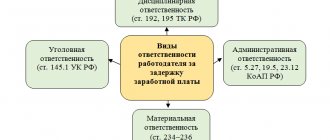14
The bailiff service deals with the collection of alimony. Appealing to the prosecutor's office with a complaint against the defaulter will not have any effect, but you can write a statement about the inaction of the bailiff, citing his failure to fulfill his official duties.
This is what they do if the bailiff does not search for the debtor’s property, does not check whether he has assets, in a word, does not do everything that could speed up the start of payments.
Before this measure, you can use other methods of influencing the executor, for example, filing an official complaint addressed to the head of the bailiff service. It must be registered, and the visitor must be given the number of the incoming document. In the future, no later than 30 days, the applicant must receive a response to his appeal.
Important! Before contacting the prosecutor's office, the applicant is not obligated to write to a higher authority. You can immediately write to the prosecutor without contacting higher bailiffs.
Application to the prosecutor's office
The application is submitted to the prosecutor of the city or district in whose territory the applicant’s rights are violated. If the prosecutor's office decides that the application should be considered by officials of other government agencies, it may redirect the application, of which the applicant will be notified.
The application can also be sent by mail - registered mail with acknowledgment of delivery.
How to write a statement about non-payment of alimony
An application to the prosecutor's office can be written in free form, since the law does not provide for a strict form of the document. However, we will consider approximately what form and content a document submitted by citizens to a government agency should have so that it is not only considered, but also accepted for work.
The document structure should look like this:
- Statement header
- Information about the department of the prosecutor's office or the prosecutor to whom the application is being submitted;
- Applicant details (full name, residential address, contact phone number);
- Document title "Application"
- Descriptive part of the statement
The descriptive part contains a chronologically sequential, detailed statement of the circumstances of the case: the adoption of a court decision, the submission of a writ of execution to the SSP and the opening of enforcement proceedings. It is necessary to list your actions, as well as the actions or inactions of the bailiff, for example, bank accounts were not arrested, the right to travel abroad was not limited, the debtor was not searched, and so on.
It is necessary to indicate the amount of alimony debt at the time of filing the application. The more circumstances confirming violations on the part of the bailiff are contained in the descriptive part of the application, the higher the likelihood that the prosecutor’s office will understand and take the necessary measures.
- The operative part of the statement
The operative part is final; it sets out a request to the prosecutor to conduct an inspection of the work of the bailiff, to bring to justice officials of the SSP who do not properly fulfill the duties assigned to them by law, to bring to justice the alimony defaulter.
- Applicant's signature
- Date of application.
Documentation
The application must be accompanied by documents confirming the circumstances stated in it:
- Passport;
- A court decision on the payment of alimony;
- Resolution of the bailiff on the opening of enforcement proceedings;
- Copies of applications and complaints submitted to the bailiff, copies of written responses and decisions of the bailiff or the head of the SSP department.
- Other documents.
Sample application to the prosecutor's office for non-payment of alimony
If drawing up an application causes you difficulties, seek legal advice! Our portal provides free consultation services from professional lawyers.
An example of an application to the prosecutor's office can be found below:
Key points:
- An application to the prosecutor's office is submitted only in extreme cases.
- If the bailiffs are inactive, do not want to do their job, or abuse their powers, the recipient of alimony has the right to contact the prosecutor’s office.
- The application can be submitted at the reception, by mail or on the official website.
- The application must contain specific actions/inactions of the bailiff, the amount of debt, the nature of collection, responses to the applicant’s requests, etc.
- The prosecutor's office is conducting an investigation into SSP officials.
- A complaint allows you to speed up the work of bailiffs, stop their illegal actions and achieve payment of alimony. The perpetrators may be subject to disciplinary or criminal liability (as appropriate).
- The alternative is to go to court.
- Due to frequent changes in legislation, information sometimes becomes outdated faster than we can update it on the website.
- All cases are very individual and depend on many factors. Basic information does not guarantee a solution to your specific problems.
That's why FREE expert consultants work for you around the clock!
- via the form (below), or via online chat
- Call the hotline:
Alimony payments help a single mother or father stay afloat, support the child, develop him and do everything to ensure that the latter grows up as a normal person. And as a result, the lack of payments sharply reduces the capabilities of the child’s parent.
Expert opinion
Novikov Igor Timofeevich
Legal consultant with 6 years of experience. Specializes in the field of civil law. Law teacher.
It’s one thing when the delay is not too long and does not play a special role. And it’s completely different when the payer deliberately hides and does not want to fulfill his obligations under any circumstances.
Is it possible to submit an application to the prosecutor's office to initiate a criminal case in such a situation?
Complaint about the inaction of the bailiff executing alimony
The magistrate decided to collect alimony from the defendant for the maintenance of his minor son. Based on the court decision, a writ of execution was issued and transferred to the bailiff service for execution.
The bailiff did not take any action on the writ of execution, citing the fact that the debtor was absent from his last known place of residence. The bailiff was asked to establish the location of the debtor.
The applicant requests that the inaction of the bailiff in enforcement proceedings be declared unlawful and that the measures that must be taken for the proper execution of the court decision be determined. By the decision of the magistrate of court district No.____ _____________ district of ____________ region dated __________, it was decided from _______________________ to collect alimony for the maintenance of the minor son ______________________, born on _________, in the amount of _______________________. Based on the court decision, a writ of execution No. ___ dated _______ was issued, which was transferred for execution to the bailiff service of the city.
____________ __________ region.
In accordance with paragraph 10 of Article 30 of the Federal Law “On Enforcement Proceedings” dated October 2, 2007 N 229-FZ, if the executive document is subject to immediate execution, then after receipt by the bailiff department it is immediately transferred to the bailiff, whose powers extend to the territory where the execution should be carried out, and in case of its absence - to another bailiff.
According to the above law, enforcement proceedings are carried out on the principles of timely execution of enforcement actions and the application of enforcement measures (Article 4, paragraph 2).
The bailiff did not take any action on the writ of execution, citing the fact that the debtor was absent from his last known place of residence. The bailiff asked me to establish the location of the debtor.
While in accordance with paragraph 10 of Article 64 of the Law “On Enforcement Proceedings”, in the process of fulfilling the requirements of enforcement documents, the bailiff has the right to search for the debtor, his property, search for the child independently or with the involvement of internal affairs bodies. The same requirements are contained in Art.
65 of the above-mentioned law in the absence of information about the whereabouts of the debtor according to enforcement documents containing demands for the protection of the interests of the Russian Federation, constituent entities of the Russian Federation, municipalities, demands for the collection of alimony, compensation for harm caused to health or in connection with the death of the breadwinner, demands for the removal of a child , the bailiff, on his own initiative or at the request of the debtor, issues a resolution to search for the debtor, which is approved by the senior bailiff.
In the same manner, a decision is made to search for the debtor’s property or search for a child. Also, paragraph 2 of Article 65 of the Law “On Enforcement Proceedings” regulates the procedure for declaring a search for a debtor - the search is announced at the place of execution of the enforcement document: at the last known place of residence or place of stay of the debtor, the location of the debtor’s property or the place of residence of the claimant.
Based on Article 121 of the Federal Law “On Enforcement Proceedings” No. 229-FZ of October 2, 2007.
decisions of the bailiff and other officials of the bailiff service, their actions (inaction) to execute the writ of execution may be appealed by the parties to the enforcement proceedings, other persons whose rights and interests are violated by such actions (inaction), in the order of subordination and challenged in court .
recognize the inaction of the bailiff in enforcement proceedings No. ______ as unlawful and determine the measures that must be taken for the proper execution of the court decision. due to the lack of alimony from the moment of its establishment to the present and the lack of information on its receipt, being a claimant in enforcement proceedings, take actions to execute the writ of execution dated “____” __________ _____g. No. _________.
- the guilty perpetrator ignores his professional obligations dictated by a separate law. For example, it is necessary to introduce a ban on carrying out registration actions on transport, but the specialist does not do this;
- the implementation of the decision is properly documented, but in fact nothing has been done (fraud).
It turns out that winning a case in court is not enough for this decision to have positive results. In addition to the successful completion of the trial, the decision must be properly considered in compliance with the deadlines specified by law. Practice shows that this is often hampered by the inactivity of irresponsible performers.
In the event that no action is taken regarding the debt, a statement of claim for non-payment is not formed, it is necessary to respond to the inaction of the executor. First of all, you can complain to the immediate supervisor of a specific person, this is the head of the bailiff service department.
If there is no response, then the next step is to contact the FSSP department with a complaint. If this action does not bring the desired result, file a lawsuit. But there is another legal way to respond by contacting the prosecutor’s office with a complaint about the inaction of an official.
Is it possible to contact the prosecutor's office for alimony?
Formally, it is possible. In fact, such a complaint makes no sense.
After the recipient of alimony files an application to the court, the Bailiff Service (Bailiff Service) takes the matter into its own hands. And the bailiff is already dealing with all other problems, including appealing to the prosecutor’s office.
The recipient of the funds can send such a statement, but will receive a response that the SSP deals with such matters and should contact them there. That is, there is no need to waste time on such statements.
However, there is one point in which an application to the prosecutor’s office may be the only option that will allow you to receive alimony. Some bailiffs perform their duties without due diligence.
It is almost impossible to get specific answers or actions from them. And if this goes beyond what is reasonable, you should first try to complain to the head of the territorial structural unit of the SSP.
Sometimes it helps. And if not, then you can already write a statement to the prosecutor’s office stating that the bailiffs are not fulfilling their duties.
Although this is not in the literal sense of the word a statement of non-payment of alimony, in the end, this is exactly the result that everything will come down to. So, you can look at it in a similar way.
How to write a statement to the prosecutor's office about non-payment of alimony
The prosecutor's office supervises the activities of bailiffs (Article 19 of Law 118-FZ). As part of this supervision, the prosecutor is obliged to take all actions within his power to ensure that the SSP works as required.
It should be borne in mind that the applicant does not have the right to demand that the bailiff perform any actions necessary for the interested person. However, this person may indicate that the bailiffs do not fulfill their duties or do so only formally, without a real final result.
Such applications are carefully considered and, based on their results, an audit is carried out by the bailiff service. As a rule, this forces the latter to work with maximum efficiency and ultimately the applicant still gets the result he needs.
Reasons
This type of application can only be submitted on the following grounds:
- If the bailiff exceeds his own powers or commits other illegal actions.
- If the bailiff is inactive and does not take any actions at all that he is obliged to take.
- If the bailiff illegally makes a decision regarding a specific case, thereby ignoring the interests and requirements of the applicant.
How to direct
There are three different ways to submit this type of application:
- In electronic form on the website of the prosecutor's office. Please note that all documents will need to be scanned and attached to the letter, which is not very convenient.
- By registered mail. Convenient, simple and fast, but there is a small chance that the letter will get lost somewhere and will not reach the addressee. Such situations do not arise too often, but they cannot be ignored.
- Apply in person to the prosecutor's office. This is the most optimal and reliable option, but not the most convenient, since you will need to first check the office hours, and then set aside time and go to the department.
Sample application to the prosecutor's office for non-payment of alimony
Penalties for the evader
When the court issues a writ of execution to bailiffs, the powers to monitor the situation regarding alimony obligations are transferred to them. That is, the bailiff is obliged to monitor the movement of funds from the payer to the recipient on a monthly basis. As soon as the amount of debt exceeds 10 thousand rubles, penalties may be applied to the draft dodger.
Administrative punishment
This measure allows the child support worker to remain free, but significantly limits his independence of movement. So, if there is a slight and initial delay in payments, a fine will be issued against him.
For each day of delay, penalties are imposed. If such measures are not scary, the bailiffs find the debtor’s property, bank deposits and seize them.
This means that the draft dodger does not have the right to make real estate transactions, sell and give away small property, or use accumulated money.
As soon as the debt is repaid, the arrest is lifted.
Additional penalties include a ban on leaving the Russian Federation, and it does not matter what the purpose of the trip is: for work, for vacation, for permanent residence or to say goodbye to a deceased relative. At passport control he will be stopped and asked to pay off the debt.
Documents regarding debts are submitted according to a summary to the traffic police; employees have the right to suspend the debtor’s rights and stop him on any section of the road. The right to drive a car is returned to him when the papers on non-payment of alimony are canceled by the FSSP.
Criminal liability
When it is obvious that the debtor is persistently, deliberately ignoring the requirements under the writ of execution and the resulting debt is over 4 months, the draft dodger becomes malicious and measures are applied to him under Art. 157 of the Criminal Code of the Russian Federation .
Under the article, the alimony holder faces correctional (forced) labor, arrest for up to 3 months, or full imprisonment for up to 1 year.
Further actions
Expert opinion
Novikov Igor Timofeevich
Legal consultant with 6 years of experience. Specializes in the field of civil law. Law teacher.
Once the application is accepted by the prosecutor's office, there are 30 days within which it must be considered. The procedure looks like this:
- The information from the application is verified.
- A decision is made.
- The applicant receives notification of the results of the inspection.
Possible test results:
- No violations were identified.
- Minor violations were detected. The contractor is ordered to eliminate them within a limited time.
- Serious violations have been identified. The culprit is brought to justice.
FREE CONSULTATIONS are available for you! If you want to solve exactly your problem, then
:
- describe your situation to a lawyer in an online chat;
- write a question in the form below;
Strictly speaking, the issue of non-payment of alimony is not the subject of consideration by the prosecutor's office. Any problems that arise when making alimony payments must be resolved by bailiffs.
If a person who, according to a court decision, must pay alimony, evades this, then he should write a statement to the bailiffs to initiate a criminal case under Article 157 of the Criminal Code of the Russian Federation.
It makes sense to contact the prosecutor's office if, in your opinion, the representative of the service for the execution of court decisions does not take any action (or takes insufficient actions) to ensure that the debtor begins to fully fulfill his obligations. The statement should state a complaint against the actions of the bailiff and ask the prosecutor to investigate them.
Emergence of the right to receive alimony
When a married couple with minor children divorces, the children usually remain with one of the parents. The second parent will be obliged to provide financial support to the child until he turns eighteen years old. The decision to pay material resources (alimony) may be:
- voluntary, when divorcing spouses agree on the amount and procedure for making payments;
- by court decision, when all issues regarding payments are accepted by the court.
In the case of a voluntary agreement and recognition by one of the spouses of his obligation to financially support the children, there are practically no problems with the payment of alimony. In the case where alimony is ordered by the court, situations are possible in which the debtor not only delays in paying it, but also maliciously evades it.
Responsibility for non-payment of alimony
The legislation provides for both administrative and criminal liability for non-payment of alimony. Administrative measures against the debtor may include:
- monetary fines;
- accrual of interest on the amount of overdue payments;
- seizure of property and cash deposits of the debtor;
- deprivation of parental rights;
- restriction of certain personal freedoms of the defaulter (for example, the right to free movement across the border of the Russian Federation).
If alimony payments are not made for a long time, then criminal proceedings may be initiated against the defaulter. A prerequisite for initiating a criminal case is the intentionality and awareness of non-payment of alimony.
Criminal liability includes:
- arrest up to three months;
- compulsory work;
- imprisonment up to one year.
Any measures of influence against a person who evades payment of alimony are carried out by the bailiff service on the basis of relevant statements. There is no point in contacting the prosecutor's office on these issues.
An application to the prosecutor's office should be submitted if the bailiffs are delaying the case of collecting alimony or are not conducting it promptly enough.
Requirements for an application to the prosecutor's office
An application to the prosecutor's office does not require special preparation and can be written by hand in any form. It should be borne in mind that this is an official document, therefore, when preparing it, the use of swear words or profanity is unacceptable.
Illiterate writing of the application can greatly delay the consideration of the application. This especially applies to the style of presentation; if the essence of the claim and the applicant’s request are not clear from the content of the application, then consideration of it by prosecutors may be suspended.
Among the general requirements for applications submitted to the prosecutor's office is the mandatory signing by the applicant. Anonymous applications will not be considered.
Contents of the application to the prosecutor's office
The header of the application must contain the information of the prosecutor to whom the document is addressed. In addition, the most detailed and complete information about the applicant is also indicated here. Such data includes first name, last name, patronymic, registration address, contact information.
When writing the application itself, it is necessary to describe the entire situation in as much detail as possible and in the correct chronological order - your actions, the actions of the representative of the bailiff service, indicate the amount of the existing debt, and so on. The more relevant facts are indicated in the narrative part of the application, the easier it will be for the prosecutor to understand and make a decision.
In the operative part, it is necessary to clearly state the essence of the request and the violations that, in your opinion, were committed by the bailiff. If you are not able to correctly indicate the violated points of the law, then it is better not to do this - this will only complicate the consideration of the case by the prosecutor.
Enforcement measures against a person who evades alimony payments are used by the court on the initiative of the bailiff or the alimony recipient. Today there is a high employment of FSSP representatives.
Practice shows that sometimes recipients of funds have to send applications and complaints in order to control the process of applying liability measures to the alimony provider themselves. Let's look at how to write a statement to the prosecutor's office about non-payment of alimony.
✅ Measures of influence on non-payers of alimony
So, we have already mentioned that the legislation of our state provides for administrative and criminal liability for non-payment of alimony.
Administrative measures include:
- Money penalty;
- Penalty (accrual of interest on overdue alimony payments);
- Seizure of movable and immovable property, funds in bank accounts;
- Deprivation of parental rights;
- Deprivation of driving privileges;
- Ban on the right to travel abroad of the Russian Federation.
If the non-payment of alimony is of a protracted, systematic, malicious nature, the debtor is no longer brought to administrative, but to criminal liability in the form of:
- Arrest (up to 3 months);
- Imprisonment (up to 1 year).
As you can see, the sanctions are severe. And if the matter does not come to imprisonment, the debtor’s rights may be taken away or his accounts may be seized - which, you see, will also hurt his pride.







